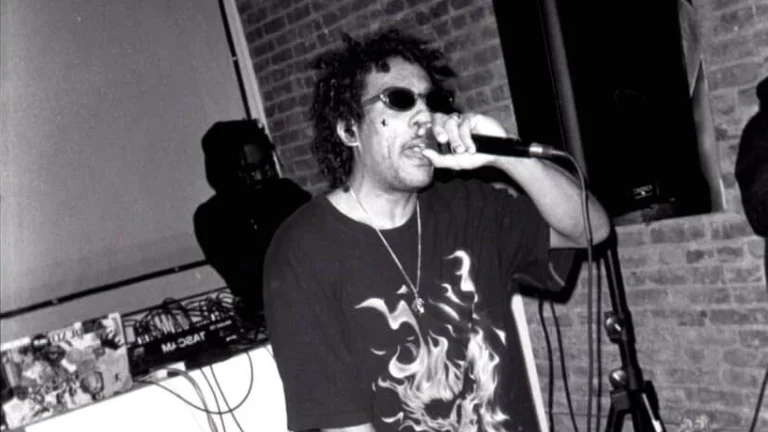Freddy Stone wants to get to know you, and he wants you to know him, as is evident with his latest release Dad’s on Dope, with production by Samurai Sham. The project opens with an intro consisting of two voicemails delivering pretty solemn news, then abruptly switches to the first song, “Bitch, I’m High.” It’s that kind of ride.
According to Stone’s Bandcamp statement accompanying the album, “We’ve all witnessed the drunk uncle (or aunt/cousin/parent/etc.) wilding out at Thanksgiving when you go home for the holidays. But sometimes YOU’RE the drunk uncle at Thanksgiving. Hahahaha.” The raw honesty that Freddy demonstrates in that statement becomes even more vulnerable on the album itself, which features generational concerns about substance abuse, preoccupations with sex, and being a “scumbag.”
“This album is really special to me. I haven’t released a brand-new full length in 2 whole years,” he says on Bandcamp, though clocking in at just over fifteen minutes, “full length” is something of a misnomer. The songs are all short—only two tracks run over two minutes—typically containing only one verse of rhymes, sometimes repeated for emphasis, and this perhaps is Stone’s way of seeking an instant connection with his listeners. His admissions are frank and unfiltered, as he lays himself bare for our amusement. On the standout track “Krypto, the Super Dog (ft. AJ Suede),” he admits “Even if I wanted to quit I couldn’t / I ain’t where I supposed to be / I’m getting weeded and I’m supposed to be out getting groceries.” Freddy demonstrates that— ego aside—he knows who he is and how he appears to others. On the track “Bleach Blonde” he says “Pretty bitches want to suck me off ‘cause I’m a cutie pie / and drink too much and barf a lot and do cocaine in a parking lot / and do too much and start to talk a lot / like I’m in a barber shop.”
The production is immaculate. Samurai Sham employs smooth jazz elements—muted drums accentuated with flute, piano, guitar, and Hammond organ. The airy, soulful samples are a perfect bedrock for the energetic, introspective raps laid down by Stone. Like the slurred stream of consciousness in a haze of dope at three in the morning, Stone’s delivery is meant to connect with his audience authentically.
We agreed to meet for an interview as we were both New Jersey residents at a Dunkin’ Donuts in Garfield. I arrived early, noting the establishment’s small indoor space, the frequent turnover of guests, and the aggressive parking lot power-washing at the banquet hall across the street. When Stone arrived, sporting red shorts and an oversized hoodie, I suggested we walk and talk, and he suggested a park around the corner.
I went into the album blind, and when I read it was called Dad’s on Dope I thought it was from the son’s perspective. But as I was listening to the record I realized it was more of you admitting, “Hey kid, your dad’s on dope.” Tell me about that journey.
It can be both, you know? Generational? It’s like a coverall. I can’t explain it—it’s more just, like, Shithead Chronicles.
There’s a line in “Thirty Days” where you say “apples never fall far from trees.” What is your relationship with your father like?
My father’s dead, actually. He died last year, and I really wasn’t close with him at all. I’d met him a handful of times and I didn’t know him well at all, but he did have addiction issues. Towards the last year of his life, I didn’t get to kick it with him as much as I would’ve liked to. And that’s what the album is about, too. A lot of self-realizations and [missed opportunities].”
How do you feel your relationship is shaping up with your son?
I love Jupiter so much! We actually have a new situation. I’ve always lived with him, but his mom recently moved to Florida, so that can be tough, too. Maybe like three months ago? So this is all fairly new to me, [I mean] not living with him. I guess this is what the album is about, too—it’s a lot of stuff, basically just rock-bottoming out and trying to make it into something positive, that others can [recognize].
So, it’s kind of like you’re sketching a portrait of yourself for you to see.
Right, it’s like I’m documenting it. This is me at this time, this is the things I feel and the things I’m thinking, you know what I mean?
Now, the album cover—what’s going on there?
I had that picture for a very long time. When the album came and I was looking for a cover, I knew it encapsulated what I was trying to talk about. It’s a personification of me… you never know what the fuck’s going on, but whatever is going on, it’s cool.
Tell me about bringing Samurai Sham into this album process. You mentioned on Bandcamp that you’d already recorded the whole thing yourself and he suggested heading to the studio and laying it down properly.
I was living in Brooklyn and I just moved back here [to Garfield, New Jersey]. This is my home town, like I graduated high school here. It was weird. I don’t have as many friends as I used to have. I reconnected with Sham and we made this just to make it. I was in the shit and just ended up making it. I just want other people to relate to it. Someone hit me up the other day and said ‘Yo, thank you for discussing bipolar disorder on the album. I have it, too, and it makes me feel less weird.’ And that’s what I’m in it for.
Listening to Dad’s on Dope, one can note immediately that your passions are drugs and sex, in that order. What’s a passion of yours that might surprise someone?
Honestly, anything that allows me to connect with people. I share more on this album than I do just chilling with even my best friends so if this can bring people together or make them feel seen then that’s what I want to do.
For all of his wilding, Stone seems genuine. We walked back to the Dunkin’ where I’d parked my car, and a passerby in a vehicle called out to him. He’s a local presence and a welcome neighbor. He raps about “doing blow off of titties / it’s three in the morning / I took a shit / I hit the bathroom / I’m parking the toilet,” but he just wants everyone to be safe and have fun. As we parted, I thanked him for his time, and he, in turn, thanked me.
“Thank you guys for doing this shit. I’m just a regular ass person like everyone else. That’s kind of what the album is about, too. Just like an everyman’s type of album. This is shit that we all think about. Do you know how many guys have gone through that same exact thing? Like you’re 25, at the apex of your life, and then it just goes awry, and you’ve got to fucking pick up the pieces? Fast? Yeah, so that’s what the album is about — just regular ass shit. Stuff I haven’t spoken about in super detail in previous endeavors.”





